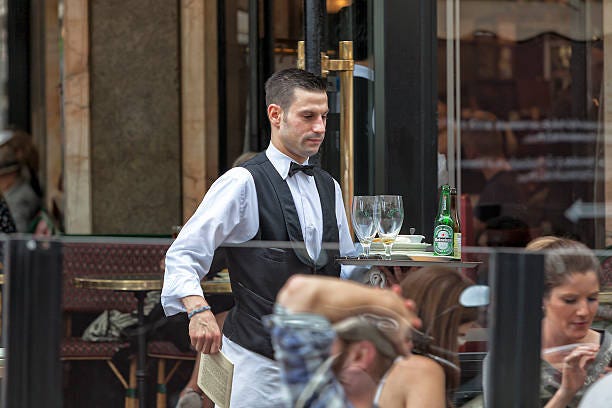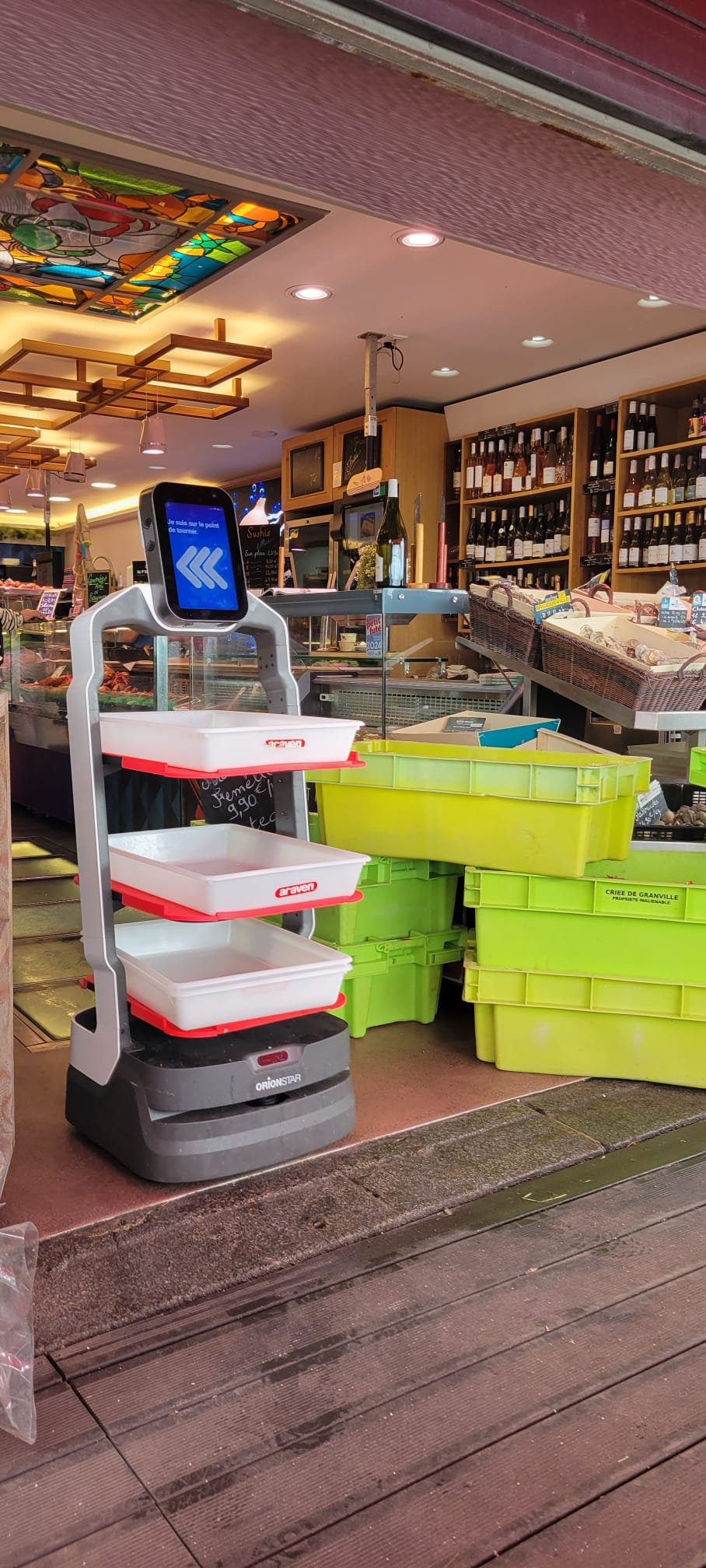There are dozens of stereotypes about the French. Most of them - like, the French don’t wear baseball caps, they have strong body odor, they take boozy two-hour lunches, they are lazy workers - are wrong-headed or outdated. One that strongly persists, however, is:
French waiters are rude.
In 27 years of frequent visits and two years’ living in France, I have encountered exactly two pissy waiters, and one of them was in Belgium. Otherwise, I have found most of the servers in this country to be friendly and attentive. Sure, some would forget to bring the water or stiff us on the bread, but they were never caustic. In fact, I’ve had delightful conversations with many of them.
In spite of my personal experience, the reputation of surly French waiters caused enough concern in 2013 for the Paris tourism board to initiate a campaign to make restaurant and hotel workers nicer to tourists.
I was reflecting on this last week as Don and I enjoyed a wonderful lunch during our vacation in Normandy. One server asked where my accent was from. When I told her we are Americans living in Rennes, I thought she was going to pull up a chair and join us. Turns out she was born in Rennes and wanted to know all the details about where we lived and what we liked about the city.
During the same vacation we had another remarkable experience with a server while eating spectacular mussels in a fish store/restaurant. This time, the amusing server was a robot who delivered food and - with the help of its human colleagues - cleared dirty dishes from tables. As the robot weaved through the crowd, it repeatedly asked people who blocked its way to move aside: Excusez-moi, it said. Je suis en train de travailler. (Excuse me. I’m working.) It was not the least bit rude.
Even without full command of the French language, you can forge pleasant relationships with servers by employing the French codes of politeness and deference.
I believe many rude-waiter experiences are caused, or at least buoyed, by cultural clashes and misunderstandings, not bad personalities. Examine, for instance, the rules of bonjour. I’ve talked about this before but it is such a big deal here that it’s worth repeating: Always - always! - begin with bonjour. When you walk into a store, search out the shopkeeper and say bonjour, even if he is in a back room. Just holler it in there. When you go to the strawberry stand at the market, say bonjour before ordering. In the boulangerie, the pharmacy, the elevator: bonjour, bonjour, bonjour. When you think a polite, excusez-moi, would suffice, don’t be fooled. Even in a choking emergency, you should use your last breath to gasp bonjour, then give the universal symbol for needing the Heimlich Maneuver.
It is truly that important. But how would you know that? In the US, we walk into a store, look at all the pretty things, pick something we want to buy, step up to the counter and then greet the store owner. If the person at the counter is French, she is likely to respond with a huff and a shrug because you have already offended her by not immediately acknowledging her presence. She isn’t being rude, she’s insulted.
That might sound overly sensitive, but in France, that one word means much more than simply “Good Morning” or “Hello.” It means, I acknowledge you and wish to show my utmost respect to you before asking you for a favor, even if it is a very insignificant request - like, where can I find the chickpeas?
These rules of engagement are very important in maintaining the tightly-woven fabric of cultural convention. So, even though it seems like a small detail, consider saying bonjour Rule #1 for creating a pleasant restaurant atmosphere in France.
Just as elusive would be Rule #2: Relinquish all Power.
The café, bistro, brasserie or restaurant is the server’s domain, not yours. Since the French don’t have a commitment to making sure the customer is always right, you must adjust your expectation of the power structure from the get-go. You are not in charge here. You need to signal your understanding of that right up front. Always ask permission. Always thank them for giving you permission.
Before you sit at that nice shady table on the terrace, ask if you can have it. Before you order the fish without the sauce, ask if it’s even possible. Before you push two small tables together for your party of four, ask if that is acceptable.
(Useful language hint for these occasions: Ça marche? It literally means, That works?, and is an easy and informal way of asking permission if you have limited French. It also works as a statement to let someone know that whatever is happening is OK with you.)
A few other hints to improve your restaurant experience:
If you don’t have a reservation, tell the server how many are in your party and whether you are there to eat lunch or just have a drink. (Pour prendre le déjeuner, or, pour boire un verre.) If you are there just for a coffee or a cocktail, do not sit at a set table.
No matter how many times you have seen it in a movie, never - ever - call the waiter, garçon. It’s basically saying, Hey, boy! (Also, don’t expect your waitress to perkily introduce herself by name. Hi and welcome to Le Bistro. I’m Fifi and I’ll be your waitress tonight! That’s not a thing in France.)
At a café the server will likely leave your bill at the table with your order. In a restaurant you might have to ask for it. Most often you’ll have to walk inside to pay at the bar or hostess counter.
Tipping is not required in France. The service is included in the bill (you’ll often see it designated as 15% service compris). Leaving a few extra Euros for good service is appreciated.
And, of course, don’t forget the requisite parting words: Merci. Au revoir. Bonne journée/soirée.







We’ve definitely learned the importance of Bonjour traveling to France over the years. Interestingly, we live in Arkansas when we’re in the states (though we’re from the north) and a greeting entering and exiting a store is pretty important in the American south as well. Places where manners are important, I suppose.
From our first residency in France in the early 70s until our current residency, some (classified) years later, I have been unable to relate to the false stigma applied to French wait staff. I have watched in amazement as one or two serveurs français will manage to hold down an entire small to medium restaurant in an efficient and effective manner. At a restaurant in Dinan this winter, three of us went to a a small hotel restaurant where the owner was the maître d', bartender, chef, sommelier, and part-time waiter. He had one waiter who did the heavy lifting after the restaurant filled at 9 pm. As in so many French restaurants - bistro to mega-star, the meal was not a meal - it was an experience that lasted all evening, if you so desired. For Theresa's Cosgrove's birthday, we went to the most exquisite seafood restaurant in Erquy in the Penthièvre, northeast up the coast from St. Brieuc. "La Table de Jeanne." We had a three-hour lunch overlooking the bay of Erquy on the Val d'Andre. Our waitress was a tiny dynamo who took care of us from the moment we walked in until the moment we left. And THAT is my take on French personnel du restaurant!